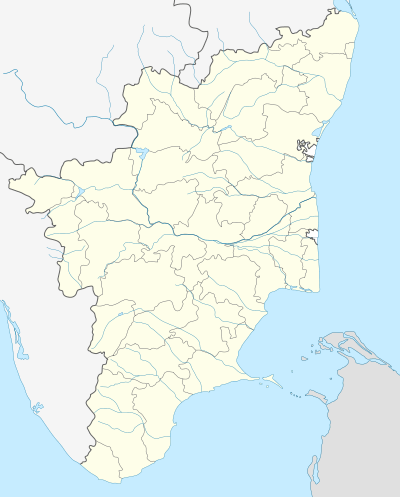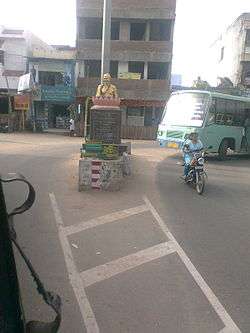Periyakulam
| Periyakulam | |
|---|---|
| Town | |
|
A busy road junction, Periyakulam | |
 Periyakulam Location in Tamil Nadu, India | |
| Coordinates: 10°07′N 77°33′E / 10.12°N 77.55°ECoordinates: 10°07′N 77°33′E / 10.12°N 77.55°E | |
| Country |
|
| State | Tamil Nadu |
| District | Theni |
| Government | |
| • Type | Second Grade Municipality |
| • Body | Periyakulam Municipality |
| Elevation | 356 m (1,168 ft) |
| Population (2011)[1] | |
| • Total | 42,976 |
| Languages | |
| • Official | Tamil |
| Time zone | IST (UTC+5:30) |
Periyakulam is a town and a Municipality in Theni district in the South Indian state of Tamil Nadu. As of 2011, the town had a population of 42,976.
Geography
Periyakulam (PKM) is located at 10°04′N 77°20′E / 10.07°N 77.33°E.[2] It has an average elevation of 282 metres (925 feet). It is located at the foothills of the Western Ghats bordering the neighbouring state of Kerala. It is one of the most fertile places in the state of Tamil Nadu. Agriculture is the primary occupation for the population here. It is also known as the "Mango City", as a major supply of mangoes from this city goes into Tamil Nadu's mango output. It stands on the bank of the 'Varaha' (in Hindu mythology, Lord Maha Vishnu's Boar incarnation) river. It is a fertile area that has an annual supply of surplus rainfall. The villages that are included are Kailasapatti, T. Kallipatti, Tamarai kulam, Vadugapatti, Melmangalam and Jeyamangalam villages that also stand on the banks of the Varaha River.
Climate
Periyakulam Town has an area of 21 km2, within an Semi urban area now extending over as much as 55 km2 and it is located at 10°04′N 77°20′E / 10.07°N 77.33°E It has an average elevation of 356 meters above mean sea level. The climate is dry and hot, with Northeast monsoon rains during October–December. Temperatures during summer reach a maximum of 40 and a minimum of 26.3 °C, though temperatures over 43 °C are not uncommon. Winter temperatures range between 29.6 and 18 °C. The average annual rainfall is about 135 cm.
Architecture
Periyakulam is a un designed river based settlement city the city has been divided into two major divisions by river into Thenkarai (Southern part) and Vadakarai (Northern part) streets around the city is based upon communal settlements symbolizing the structure of the cosmos.
Language
Tamil is spoken predominantly in and around periyakulam. Madurai Tamil is the standard dialect spoken. Periyakulam is one of the oldest town in Tamil Nadu carrying rich cultural heritage. The famous varaga nadhi is an ample example for its richness which separates the city into two halves. The city have been known by name kulanthai managaram in respect of lord muruga. The major occupation is agriculture and transportation. Periyakulam is known for its mangoes. Poet Mudiarasan belongs to this town.
History and Heritage
The name of this town derived from two Tamil words equivalent to Big lake ( in Tamil (Tamil: பெரிய) means Big and (Tamil: குளம்) is Lake). In Tamil literature, the name of this town comes as Kulainthai Managaram (Tamil: குளந்தை). There are 3 very old temples. The Balasubramaniam Swamy temple is located on the banks of the Varaha nadhi (Varaha river). Periyakal Temple and Karanamoorthy swamy temple is located on the Periyakulam pond. South east side Kailasanathar temple located in the hills. Mounaguru Swamigal Madalayam is located in Periaykulam Town. "OM SHIVOGAM" is the main chanting of Swamigal. The great Saint Arunagirinathar visited this place and composed one Thiruppugal on Lord Muruga.
Balasubramanian Temple lies in the Periyakulam - Sothuparai Road - about 2 km from Periyakulam Bus Stand. It is dated back to hundreds of years. Thirumoolar, a Tamil Sitthar wrote about this temple. Near the temple, we can see two "Marutha Marams" - each one on the northern and southern banks of River Varaganadhi. (One Male and one Female). It is said that this type of landscape is only seen at Kaasi. The Moolavar of this temple is Raja Raja Soleeswarar and his Devi is Aram Valartha Nayagi. However, the temple is named after Muruga. This temple has three kodimarams. Durga Devi, Kannimoola Ganapathi and Bairavar are other important Deities here. History of the Temple: During the 10th century, King Rajendra Chozhan who ruled this area, came to the Agamalai forest which is situated western side of the Varaganadhi. At the time of hunting he hunted a wild pig which was feeding milk to its kids. The wild pig was killed. The piglets of the dead wild pig cried for milk. At that time because of the mercy of Lord Muruga, the piglets got milk from the dead wild pig. The King saw that and built a temple for Lord Balamurugan and create a city near to the temple named Kulandhai Managaram. Because of the mercy of Lord Muruga, the dead wild pig had got place in Heaven. The sculpture of these story can be viewed in the Temple. There is a statue for Lord Ruthira Dhandava Moorthy in this temple. Next to Thirukadavur temple, a statue for Lord Mrithugnar is also in this temple. Nearer to this temple, a small temple for Azhagu Natchiamman with a beautiful garden is situated.
If you are not a Saivite, here is also an alternative. A temple for Varadharaja Perumal is situated in the Heart of Periyakulam Region. The Perumal posture is like Thirumala. Nearer to this temple, the famous Gowmariamman Koil is situated. The Gowmariamman is so powerful and is looking pretty. Gowmariamman Temple festival is a grand one and celebrated in the month of July (in Tamil Aani - Aadi). The worship methods are non-vedic. Rituals such as Thee-chatti (also called as Agni- chatti), Ayiram Kan Panai, Mulaippari are performed during the festival. People offer Mavillaku a sweet dish made with rice and jaggery. In the month of Aadi (mid July to mid August), Every Friday "Koozh" has been offered to the goddess and later distributed to the people.
Periyakulam also has a Government Hospital and Munsif Court.
Demographics
According to 2011 census, Periyakulam had a population of 42,976 with a sex-ratio of 1,013 females for every 1,000 males, much above the national average of 929.[3] A total of 4,095 were under the age of six, constituting 2,081 males and 2,014 females. Scheduled Castes and Scheduled Tribes accounted for 15.02% and .01% of the population respectively. The average literacy of the town was 79.84%, compared to the national average of 72.99%.[3] The town had a total of 11401 households. There were a total of 14,857 workers, comprising 523 cultivators, 3,051 main agricultural labourers, 272 in house hold industries, 9,492 other workers, 1,519 marginal workers, 25 marginal cultivators, 809 marginal agricultural labourers, 60 marginal workers in household industries and 625 other marginal workers.[4]
As per the religious census of 2011, Periyakulam had 78.57% Hindus, 16.01% Muslims, 5.25% Christians, 0.02% Sikhs, 0.01% Buddhists, 0.13% following other religions.[5]
Tourism
Periyakulam is also known as ‘pi City’ as it’s famous for its sweet pi. Periyakulam is also known for its sweet water which comes from the Berijam Lake kodaikanal. It has nice weather throughout the year. Periyakulam itself has so many tourist places; also around Periyakulam, you can find a number of tourist locations. To name a few, Sothuparai Dam (9 km), Kumbakarai Falls (8 km), Theertha Thotti (2 km), Vaigai Dam (15 km), Manjalar Dam (18 km), Thekkady (80 km), Surulithirtham (60 km), Munnar (103 km) and many more. The school at Periyakulam is Victoria Memorial High School which caters to education in the town. The population has been declining since the 1990s. According to World Gazetteer the population as of 2012 is only 39,185 down from 46,744 in 1991 which would mean that Periyakulam has only 8,000 people more than it did 61 years ago(1951). This would make it one of the few cities in India to have a marginal population increase since 1951. Close to periyakulam is the lesser famous Kumbakkarai waterfalls i.e. 8 km away from Periyakulam.This waterfalls was supposed to be a very dangerous waterfalls with lot of pits. Hence people used to be afraid to go near to the falls. In 1942 an affluent business person Thiru K Chellam Iyer Properitor of Bavani Krishna Vilas Hotel - Periyakulam, dredged the entire falls area,closed the dangerous holes, constructed dressing rooms,in the falls and staircases for safe access to the falls. With his efforts Kumbakkarai waterfalls turned out to be a tourist spot.
The Horticultural College & Research Institute (HC & RI), one of the constituency colleges of Tamil Nadu Agricultural University, is located at Periyakulam. Government Nursing college, is located at periyakulam.
Politics
Periyakulam was a Lok sabha constituency. Now Periyakulam assembly constituency is part of Theni (Lok Sabha constituency). Mr. O.Panneerselvam, Chief Minister of Tamil Nadu was elected from the Periyakulam assembly constituency in 2001 and 2006.He is now elected from Bodinayakkanur constituency[6]
Notable people from Periyakulam
- O. Panneerselvam, Ex.Chief Minister of Tamil Nadu
- Vairamuthu, Tamil poet
- Bala, film director
- K.M. Vignesh MBBS, NRI- China
- Muhammed Metha, Tamil poet
- Dr. P. Thirumalvalavan, Former Registrar of Bharathiar University, Coimbatore.
- Singampuli, film actor
- Mudiyarasan, Tamil poet.
- Surulirajan, film actor
- Sundarajan, film actor
- K. Chellam Iyer, Hotelier & Constructor of Kumbakkarai water falls( 1942)
- A. Chella (Late), Art Director (Flim : Sethu, Ram, Nandha, Pithamagan, Aacharrya)
References
- ↑ World Gazetteer
- ↑ Falling Rain Genomics, Inc - Periyakulam
- 1 2 "Census Info 2011 Final population totals". Office of The Registrar General and Census Commissioner, Ministry of Home Affairs, Government of India. 2013. Retrieved 26 January 2014.
- ↑ "Census Info 2011 Final population totals - Periyakulam(05843)". Office of The Registrar General and Census Commissioner, Ministry of Home Affairs, Government of India. 2013. Retrieved 26 January 2014.
- ↑ "Population By Religious Community - Tamil Nadu" (XLS). Office of The Registrar General and Census Commissioner, Ministry of Home Affairs, Government of India. 2011. Retrieved 13 September 2015.
- ↑ "List of Parliamentary and Assembly Constituencies" (PDF). Tamil Nadu. Election Commission of India. Retrieved 2008-10-11.

